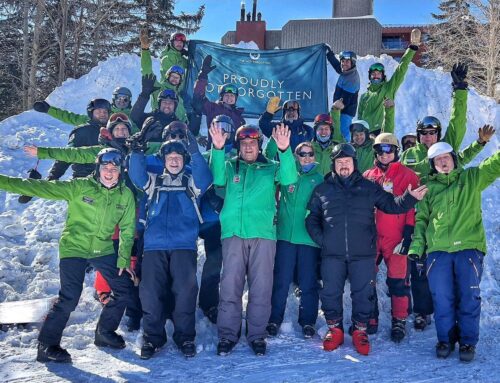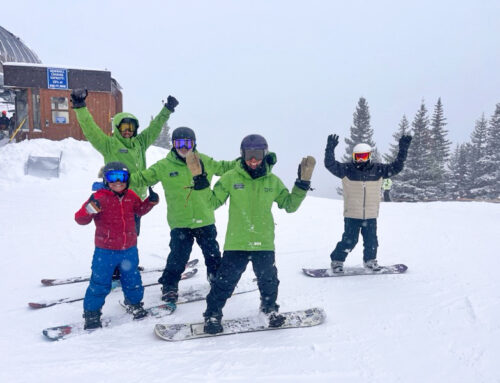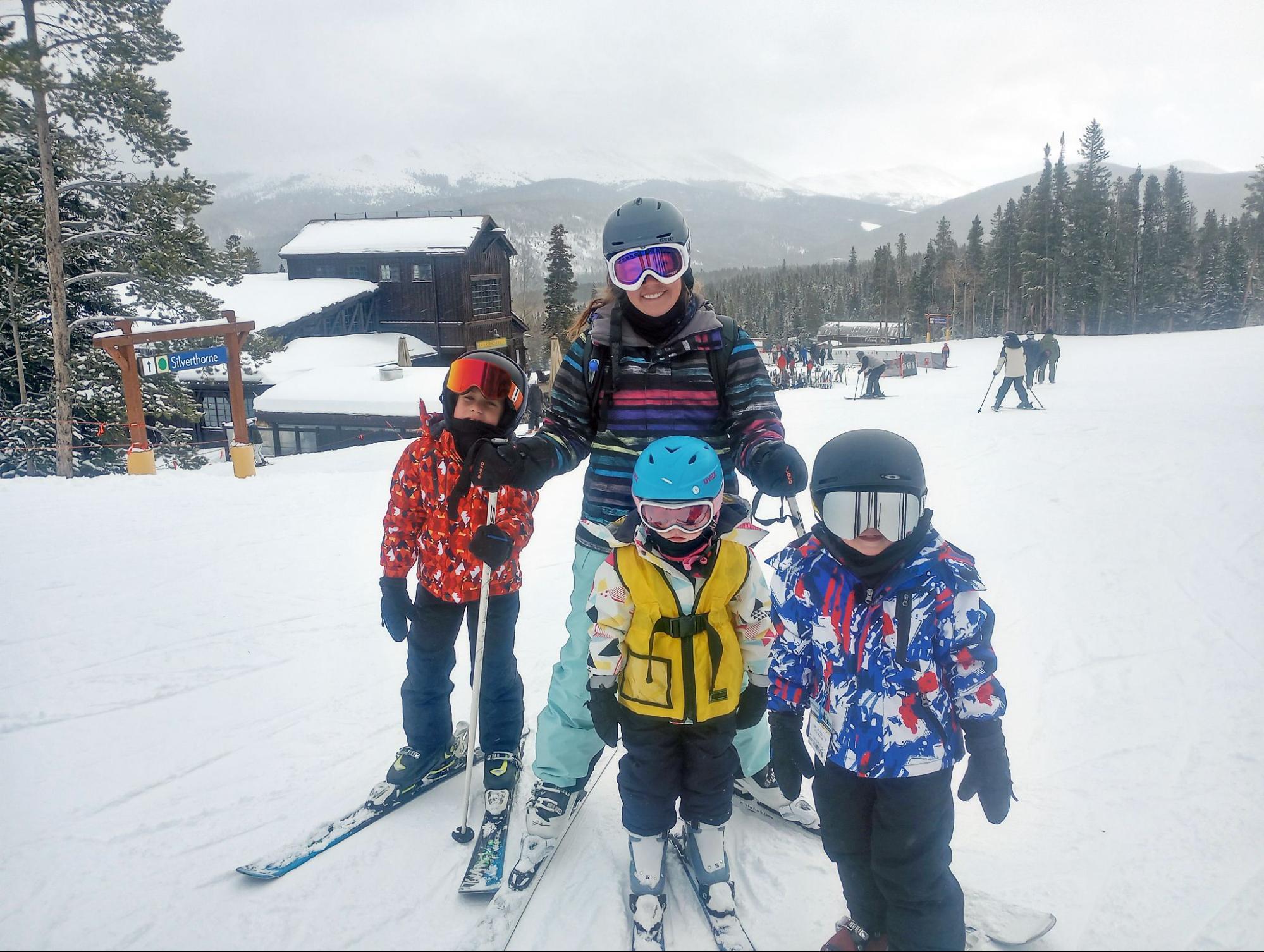
Brittany with her children Fletcher, Merrick, and Finley
When Brittany and Josiah Loeser decided to start a family, they had no idea that their three children would be born with a genetic difference that caused deafness. When their oldest, Fletcher, was born, he was screened for hearing loss at birth so they knew right away that he was unable to hear anything. Over time, they settled on cochlear implants for each of the children to offer them the best hearing possible.
Fast forward eight years and the Loesers are planning to take their children to the mountains to share their love of winter sports with them. This led to some trepidation given the “one size fits most” approach to group ski lessons. When they heard about the BOEC and its tailored approach to adaptive lessons, they decided to give it a try. Brittany describes their experience with BOEC this way:
“What an outstanding program the BOEC is! We were both hesitant and nervous to place our three, young, deaf children with cochlear implants into a mainstream ski school to experience the sport of skiing due to the lack of individual time to ensure proper helmet fitting over their cochlear implants as well as troubleshooting of implant equipment, the ability to ensure our children’s ability to hear the instructions, and ultimately to have an experience that would have our kids asking to ski over and over again.
We were absolutely blown away by the BOEC program and their staff! The entire BOEC staff was patient, professional, and very well skilled. Each of our children enjoyed their time skiing so much that we have been back three additional times in 2024, with one of our children already skiing on his own! Watching the joy on our children’s faces as they each learned and conquered something new, was simply priceless. We are so very thankful for the BOEC and the love for the sport of skiing that you have helped create in our children. We are very much looking forward to ski season 2025!”
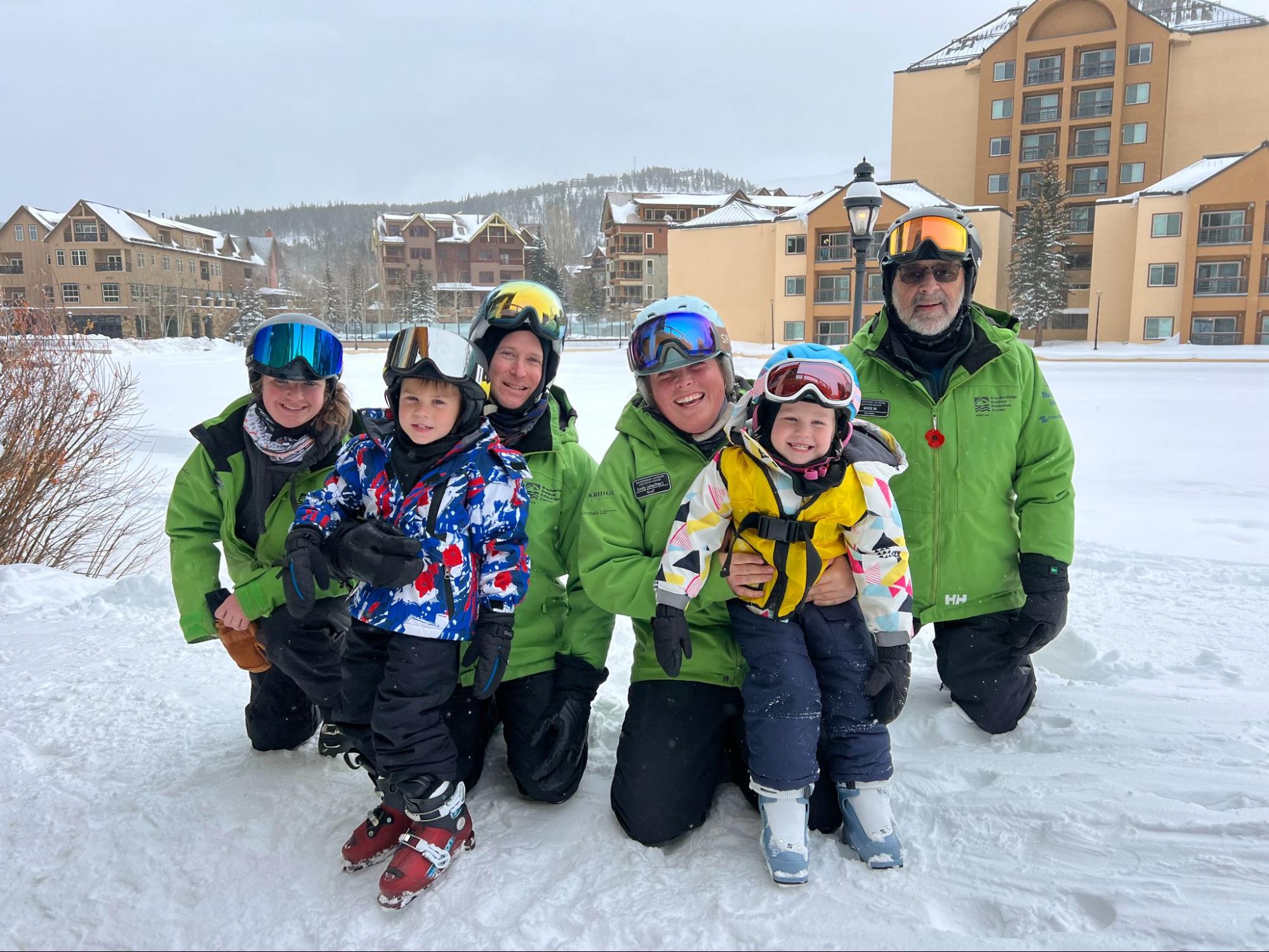
Merrick and Finley with their BOEC instructors.
After discovering that their child was born deaf, the first step for the Loesers was to try hearing aids for little Fletcher at the age of one. Studies show that it takes four years of wearing hearing aids four to six hours a day to recover from that first year with no hearing. Hearing in infancy helps language development significantly. After using hearing aids for their children at different ages, they discovered the limitations with aspects such as volume capabilities.
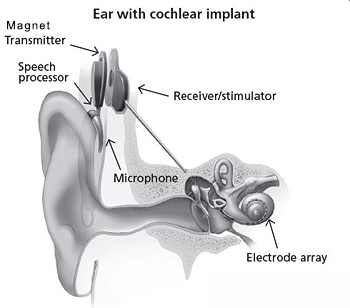 As a result, they moved to bilateral cochlear implants, medical devices that bypass damaged parts of the inner ear to directly stimulate the auditory nerve, enabling individuals with severe hearing loss to perceive sound. Each child underwent surgeries on both ears, performed before they started school to support their hearing development, with the implantation process completed a year and a half ago. This spanned a total of two and a half years. Brittany shares that the children hear fine now, they have speech therapy and visits to the audiologist who works with implants and makes adjustments as the children go through life changes. In school, when things can be noisy, the teachers are equipped with a mini microphone that connects directly to their implants to help the children hear in school.
As a result, they moved to bilateral cochlear implants, medical devices that bypass damaged parts of the inner ear to directly stimulate the auditory nerve, enabling individuals with severe hearing loss to perceive sound. Each child underwent surgeries on both ears, performed before they started school to support their hearing development, with the implantation process completed a year and a half ago. This spanned a total of two and a half years. Brittany shares that the children hear fine now, they have speech therapy and visits to the audiologist who works with implants and makes adjustments as the children go through life changes. In school, when things can be noisy, the teachers are equipped with a mini microphone that connects directly to their implants to help the children hear in school.
Brittany, mother to Fletcher (8), Merrick (6), and Finley (4), first learned to ski at Crested Butte when she was just four years old. She fell in love with skiing and it was an experience she wanted to share with her children. When considering lessons for the children, Brittany had no idea that an organization like the BOEC existed and had reservations about putting her children in a traditional resort ski school. The children’s speech therapist, Mickey Abrams, recommended the BOEC as an alternative and put Brittany in touch with Executive Director, Sonya Norris, who encouraged Brittany to try lessons with BOEC for her hearing impaired children.
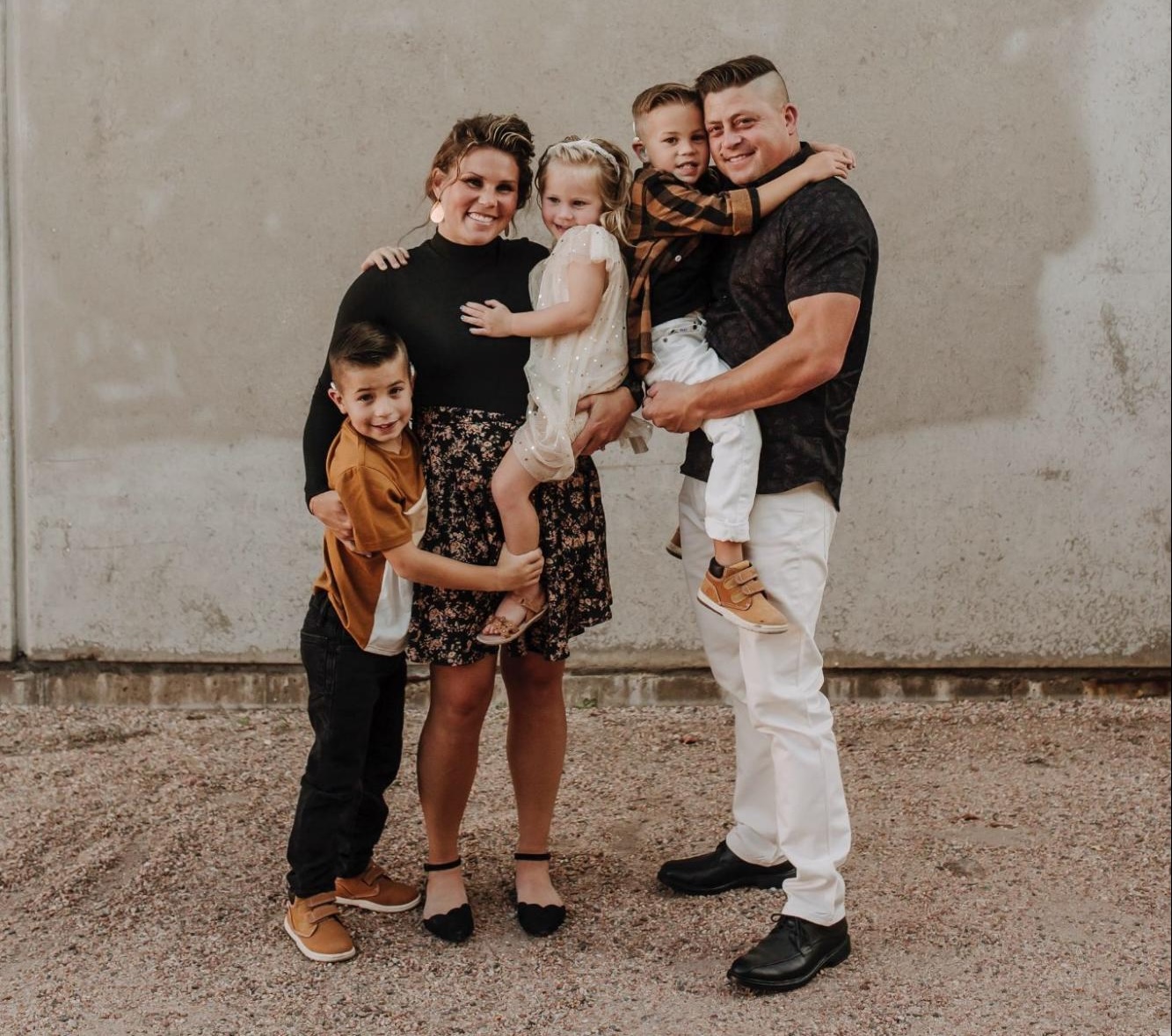
The Loeser Family from Colorado Springs.
For the Loeser family, one of the biggest advantages is the emphasis on one-on-one attention, which is beneficial for all children and especially important for those with disabilities. The BOEC instructors take the time to get down on the children’s level and talk to them, which is a different experience than one may experience in a group lesson. This creates the potential to have a great experience the student loves and will come back to, avoiding a bad first impression on the lesson which can turn the student away from skiing.
In a noisy setting, it can be hard to hear and discern what to focus on so lip reading is a natural skill they have learned, and they rely on facial expressions to accommodate hard hearing. When faces are covered it is harder for the children to focus on what the speaker is saying. With this in mind, BOEC instructors have not worn gaiters when working with the Loeser family. The Loesers initially equipped the instructor with the mini mic as they do in school, but they realized this wasn’t necessary after the first lesson due to the intimate setting.
Another challenge the Loesers faced was that the children’s ski helmets would sometimes dislodge the magnets on their heads that transmit signals from the cochlear implants. Since the children are accustomed to hearing, losing the magnets causes immediate frustration. The Loesers eventually found a better helmet to resolve this issue, but it was much easier to manage in a one-on-one lesson rather than in a group lesson.
Since Fletcher’s diagnosis, the Loeser’s lives have changed to adjust to the children’s hearing loss.They have attended numerous appointments, including five to seven hours of speech therapy each week, and have the hearing devices adjusted as needed. The process also requires the parents to actively support their children by continuing therapy exercises at home. At night the implants are turned off so the children can sleep in silence and the device’s battery can recharge. However, this leads to vulnerability since the children are unable to hear when their implants are not connected. To ensure safety in an emergency, they have had to take protective measures for the children such as beds that shake and warning alarm clocks to alert soundlessly in case of fire.
Throughout the day there is the chance that the magnet working with the implant may get knocked off, in which case the children need warnings for anything audio that they might miss. At night and bath time are the only times when the children are without their magnets and hearing. Even while playing sports, the children are able to retain their hearing by wearing bands that keep their magnets attached. In addition to skiing, the Loeser siblings also attend soccer camps, they all have taken part in gymnastics, and soon Fletcher will try baseball. Given the nature of heavy hitting sports like football and lacrosse,these are the sports they will not take part in.
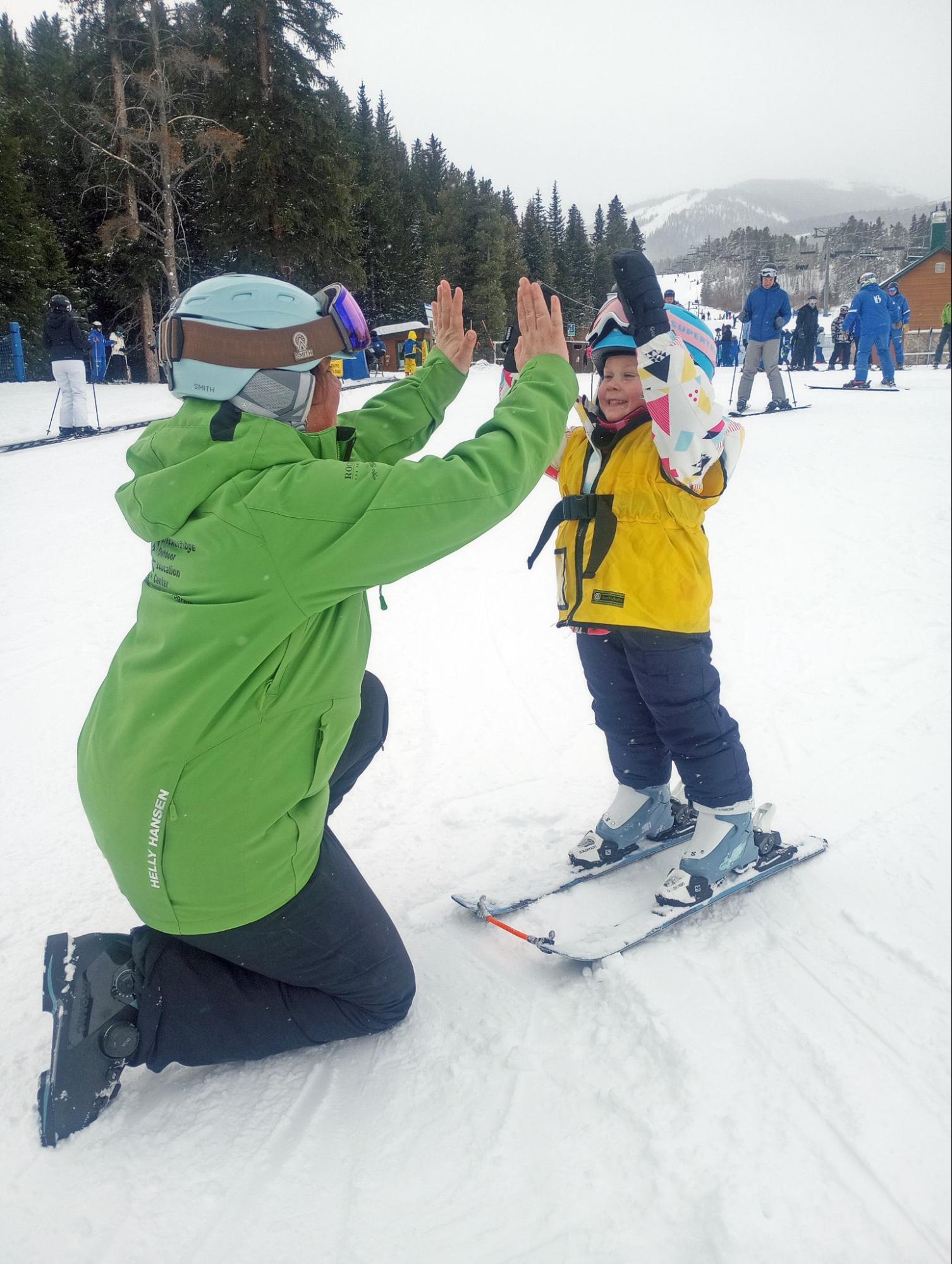
Little Finley gets a high five on her lesson.
As children, they quickly learned to communicate and have embraced speech therapy as a regular part of their lives. An inability to hear is not something they remember, living with hearing loss and implants has been normalized in the Loeser household since each of the children has this genetic difference. The children have adapted remarkably well to hearing with the implants. Although they have learned some sign language, they have successfully integrated into the world with speech, so they mostly use spoken language to communicate.
Brittany gives back and shares her knowledge for those in similar circumstances through her work on the board of the Colorado-based Listen Foundation, which provides for and assists children who are deaf and hard of hearing and their families, with access to a proven speech, language, and listening therapy method to help them achieve a life of independence. For those with children facing hearing impairment, she says, “For skiing, go to BOEC, there’s nothing like it!” For general advice, regardless of what device they have to help with hearing, the child should wear it all the time. Parents should educate the child by pointing things out, reading to them and exposing them to as much language as possible to help with development.
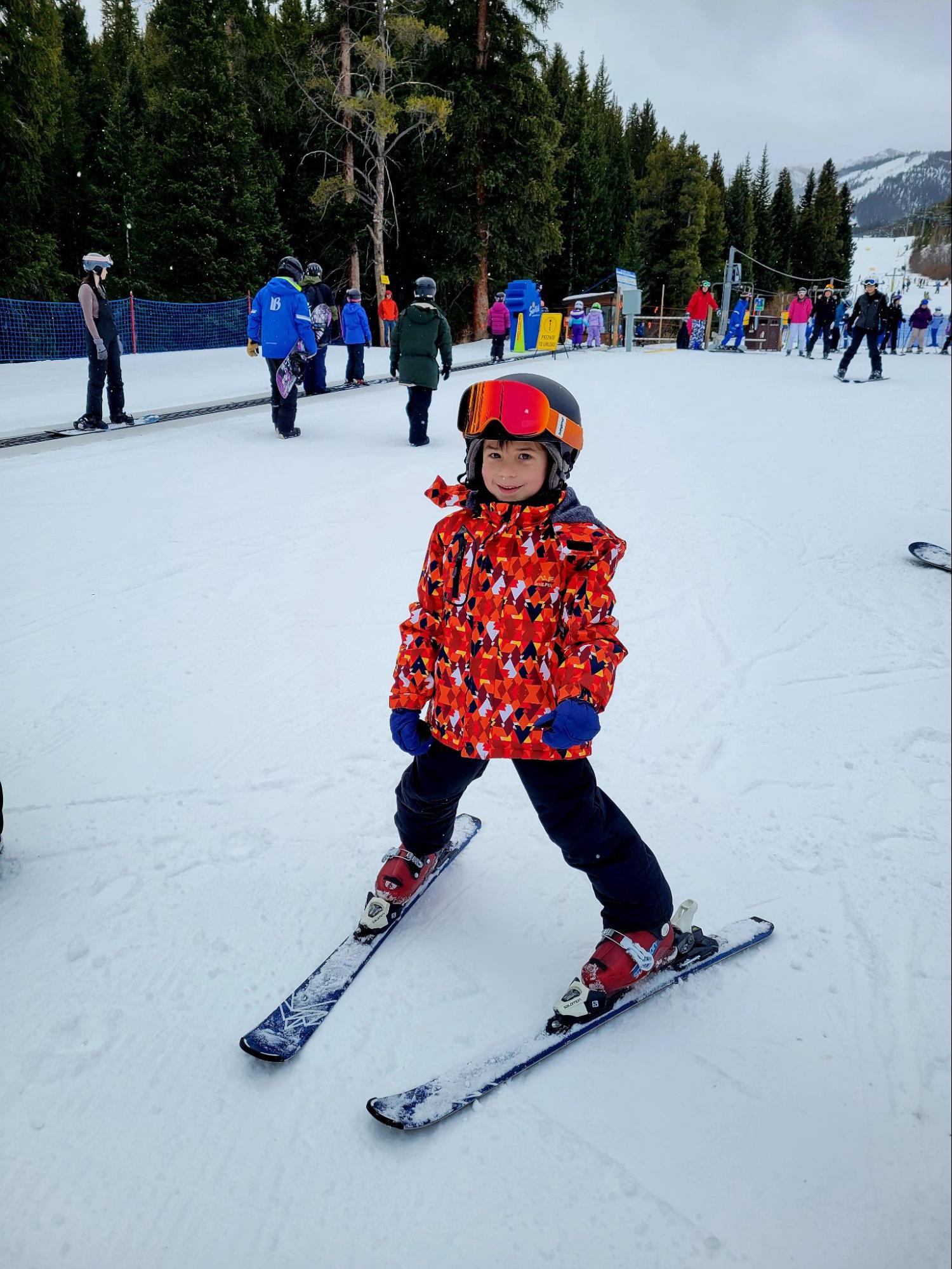
Fletcher took to skiing quickly.
Skiing gives them the chance to experience something just like any other child—a joy they might not fully realize now but can embrace effortlessly throughout their lives. After taking a lesson with BOEC, Fletcher was excited to ski on his own since he did so well in his lessons. Merrick was excited to get on the chairlift and get on the big hill skiing down the long runs. Finley, the youngest at just four years old when she started, was delighted to borrow a butterfly princess outfit from BOEC for her first ski lesson. Skiing with the BOEC has been a great experience for the kids and they enjoyed skiing immediately.
To Brittany the whole BOEC experience was shocking, two instructors to every student. She had never heard of anything like it. She explained that it’s the best price you can find for what you get which includes the instructor, a volunteer assistant, equipment and a lift ticket. She was glad to have the option for half day lessons which were perfect for her young children their first time out of the gate. The ability to do that was great, as half a day for the children was enough time for them to learn, have fun and to hopefully create a lifelong love of skiing. They will be customers until the children graduate!
She tells everyone to ski with the BOEC – there’s nothing like it!


